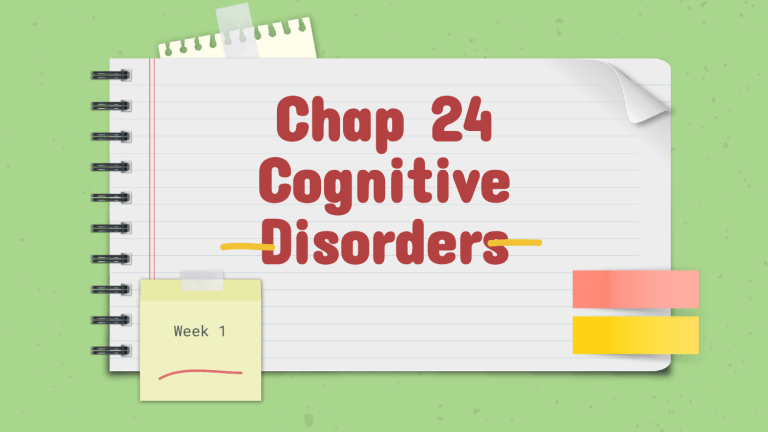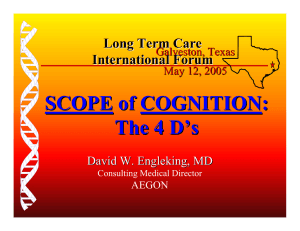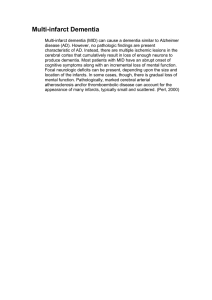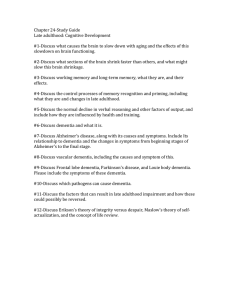
Chap 24 Cognitive Disorders Week 1 Overview Cognition ● ● Brain’s ability to process, retain, use information Processes: reasoning, judgment, perception, attention, comprehension, memory Neurocognitive disorders: disruption or impairment in higher level brain functions ● Delirium, major NCD, mild NCD, subtypes; dementia Delirium ❖ Syndrome involving disturbance of consciousness with change in cognition ❖ Usually develops over short period (hours to days) ❖ Etiology: almost always results from identifiable physiological, metabolic, or cerebral disturbance or disease or from drug intoxication or withdrawal (see Box 24.1) Treatment Find root cause An antipsychotic? Recently sedated? Drug toxicity? Substance abuse? UTI in elderly? Nursing Process Assessment ● Patient History ● Appearance and motor behavior/speech ● Mood and affect ● Thought Process and Content ● Sensorium and intellectual processes ● Judgement/insight ● Roles/relationships ● Self concept ● Physiological and self care Nursing Diagnoses ● Outcome Identification https://nurses tudy.net/delir ium-nursingcare-plans/ Click link for some great nursing diagnoses in delirium Freedom from injury ● Increased orientation, reality contact ● Balance of activity and rest ● Adequate nutrition and fluid balance Return to optimal level of functioning ● ● Interventions Promoting client safety Managing client’s confusion: orienting cues; speaking in low, clear voice; use of touch; avoiding sensory overload Promoting sleep, proper nutrition Then reevaluate… always an ongoing assessment Delirium and Community-Based Care ❖ Referrals for continued cognitive problems o Home health care/visiting nurses o Rehabilitation program o Adult day care o Residential care o Support groups Dementia Progressive cognitive impairment; multiple cognitive deficits; initially memory, later the following may be seen ● ● ● ● Different from delirium Aphasia Apraxia Agnosia Disturbance in executive function Dementia Onset and clinical course: Etiology: many causes; decreased metabolic activity found postmortem Slow onset and in stages ● ● ● Mild Moderate Severe Types of dementia Alzheimer disease Lewy body dementia Vascular dementia Frontotemporal lobar degeneration (Pick disease) Prion diseases (CreutzfeldtJakob disease) Dementia related to HIV infection Parkinson disease Huntington disease Dementia due to traumatic brain injury Treatment and Prognosis Treatment and prognosis Importance of identifying underlying cause Progressive types—progressive deterioration until death Medications for degenerative dementias: cholinesterase inhibitors (see Table 24.2) Symptomatic treatment for behaviors Antidepressants Antipsychotics Dementia Assessment Mental status examination History: client may be unable to provide accurate history. Mood and affect: increasingly labile mood; emotional outbursts General appearance and motor behavior: aphasia; apraxia; uninhibited behavior Thought process and content: impaired abstract thinking; delusions of persecution Dementia Assessment Sensorium and intellectual processes: loss of intellectual function; memory deficits; confabulation (the creation of false memories in the absence of intentions of deception) Judgment and insight: poor judgment; unrealistically appraise abilities Self-concept: sadness; loss of self-awareness Roles and relationships: profoundly affected Physiological and self-care: disturbed sleep; incontinence; hygiene deficits Diagnoses and Outcomes Risk for injury Disturbed sleep pattern Chronic confusion Freedom from injury Involvement in surroundings Interact with others in environment Interventions Safety Sleep, proper nutrition, hygiene, activity Environmental, routine structure Emotional support Interaction and involvement EVALUATE EVALUATE… ONGOING Dementia and CommunityBased Care At least half of all nursing home residents have Alzheimer disease or another dementia-causing illness Home care Adult day care Respite care Residential facilities Skilled nursing home Placement Referrals for programs and services Mental Health Promotion Research to identify risk factors for dementia ● Elevated levels of plasma homocysteine Measures to decrease risk for Alzheimer disease ● ● ● Regular participation in brain-stimulating activities Leisure-time physical activity during midlife Large social network Caregiver Role Majority are women (adult daughters or wives) Needs of caregivers: ● ● ● ● ● ● Education about dementia, required client care Assistance in dealing with own feelings of loss Respite to care for own needs, role strain Support groups Assistance from agencies Support to maintain personal life Self Awareness Teaching clients with dementia can be frustrating. Feelings of frustration or hopelessness Discuss frustrations with others. May be difficult to deal with feelings about people who will never “get better and go home” Importance of dignity for client and family





